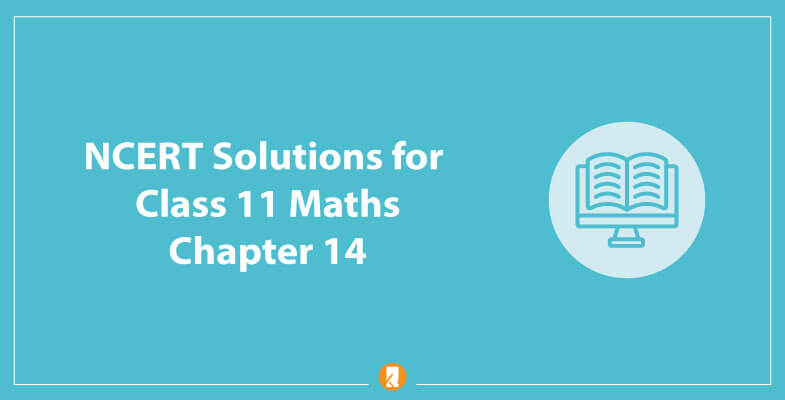Class 11 Maths NCERT Solutions comes as an aid for students who are preparing for the final exams. These solutions are also very helpful when students are doing their homework. If there are troubles while solving problems because of the absence of teachers or due to any other difficulty, you can directly look up for the solutions here. Mathematical Reasoning is a tricky chapter and that is why you must keep class 11 Maths Chapter 14 Mathematical Reasoning NCERT solutions at hand.
For all the students who think Maths is not a very easy subject, download CBSE class 11 Maths Chapter 14 Mathematical Reasoning NCERT solutions and solve Maths easily.
NCERT Solutions for Class 11 Maths Chapter 14 Mathematical Reasoning
CBSE NCERT Solutions For Class 11 Maths Chapter 14 Mathematical Reasoning PDF Download: The solutions provided in this article will cover all the exercises given in the chapter. The Mathematical Reasoning chapter solutions are prepared by educators with years of experience in Maths. The solutions will help students to understand the logic behind solving the questions.
The mathematics NCERT chapter 14 class 11 solutions also aids students in completing their homework on time. By solving the NCERT exercise questions students will acquire knowledge and understand the theorems in the chapter, they will know that the basic unit involved in mathematical reasoning is a mathematical statement. A sentence is called a mathematically acceptable statement if it is either true or false, but not both. Each exercise focus on one or the other aspect of Mathematical Reasoning.
Learners will be able to download NCERT Solutions for class 11 Maths Chapter 14 Mathematical Reasoning through the link given below in this article:
You can download CBSE NCERT Solutions for Class 11 Maths Chapter 14 Mathematical Reasoning from below.
Download NCERT Class 11 Maths Chapter 14 Solutions
What will you learn in CBSE Class 11 Maths Chapter 14 Mathematical Reasoning?
The different sections in Chapter 14 of CBSE Maths Class 11 must be solved thoroughly before the exam starts. Additionally, students must revisit old topics and revise regularly. Students can go through the Class 11 Maths solutions chapter 14 pdf download on our website.
While studying the Class 11 Maths Chapter 14 Mathematical Reasoning, you may come across sentences like ‘One plus one equals two’’. “All prime numbers are odd numbers“. Of these sentences, the first one is true and the second one is false. When there is no ambiguity regarding the sentences they are statements.
Think of a sentence that is vague or ambiguous? Consider the sentence: ‘The sum of a and b is greater than 0.’ Here, we are not in a position to determine whether it is true or false unless we know what a and b are. For example, it is false where a=1, b= -5 and true when x=1 and y=0. Therefore, this sentence is not a statement. But the sentence: For any natural numbers a and b, the sum of a and b is greater than 0 is a statement.
In Short, mathematical reasoning is a sentence that is either true or false. It may contain words and symbols. Another example – “The square root of 4 is 5” is a mathematical statement (which is, of course, not true).
Class 11 Maths Chapter 14 Mathematical Reasoning Mathematical Reasoning has 5 exercises. There is a total of 13 topics including the introduction. The sections of chapter 14 are given as follows:
- 14.1 Introduction
- 14.2 Statements
- 14.3 New Statements from Old
- 14.3.1 Negotiation of a Statement
- 14.3.2 Compound Statements
- 14.4 Special Words/ Phrases
- 14.4.1 The word “And”
- 14.4.2 The word ‘or’
- 14.4.3 Quantifiers
- 14.5 Implications
- 14.5.1 Contrapositive and Converse
- 14.6 Validating Statements
- 14.6. By Contradiction
We can also look into a method for producing new statements from those that we already have. Study of statements, let’s take a look at an important technique that we may use to deepen the understanding of mathematical statements. This technique is to ask not only what it means to say that a given statement is true but also what it would mean to say that the given statement is not true.
Secondly, CBSE Class 11 Maths Chapter 14 Mathematical Reasoning – Mathematical Reasoning also tells that the denial of a statement is called the negation of the statement. Many mathematical statements are obtained by combining one or more statements using some connecting words like ‘and’, ‘or’, etc.
Advantages of following Class 11 Maths Chapter 14 Mathematical Reasoning Mathematical ReasoningSolutions
- A statement is a sentence when it is mathematically accepted. It can be either false or true.
- What is the negation of a statement: Take a statement and denote it by s then its negation will be denoted by ~s.
- 4 methods can be used to check the validity of a statement. (1) Direct Method (2) Contrapositive Method (3) Method of Contradiction (iv) By using a Counterexample.
- We can use “If ”, “only if ”, “ if and only if ” as implications in a statement.
- Compound Statement: When a statement is made up of 2 or smaller parts (component statements) it is known as a compound statement.
We have covered the complete guide on CBSE NCERT Solutions for Class 11 Maths Chapter 14 Mathematical Reasoning. Feel free to ask us any questions in the comment section below.
